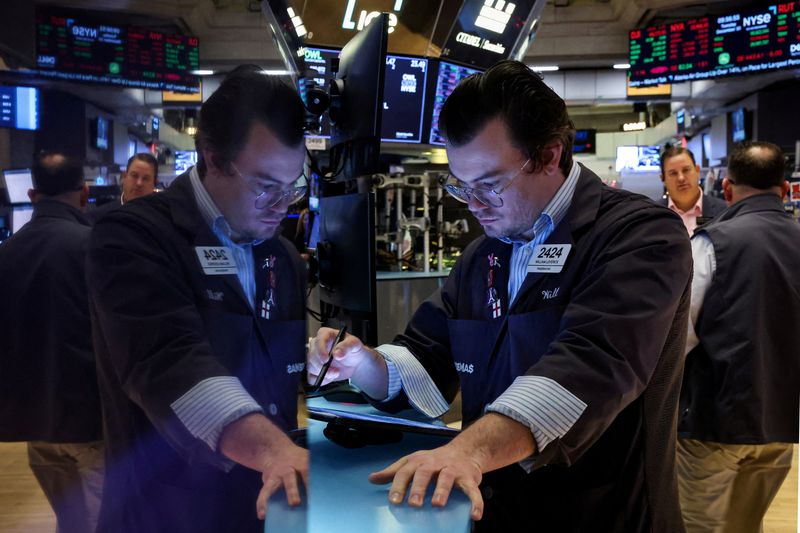A look at the day ahead in U.S. and global markets from Mike Dolan
The first full trading week of 2025 kicks off with markets positioning for the Jan. 20 inauguration of Donald Trump as President, lifting U.S. ‘long bond’ yields to their highest in two years and forcing Beijing to calm nervy Chinese markets.
With fiscal concerns to the fore as a new Congress convened on Friday and narrowly re-elected Republican Mike Johnson as speaker, the 30-year Treasury bond yield on Monday hit its highest level in more than two years – breaching last year’s peak to reach 4.85%.
The long bond yield is now stalking the 5% level last topped in late 2023 and the 2-to-30-year yield curve gap is at its widest in more than three months.
Reflecting the degree to which rising long-term borrowing rates are down to concerns about fiscal impact of tax cuts and long-term inflation uncertainty, the New York Federal Reserve’s estimate of the 10-year ‘term premium’ demanded by investors to hold longer term debt to maturity is at its highest since 2015.
But the brisk growth and relatively hawkish Fed picture is playing its part too, with Friday’s surprisingly upbeat U.S. manufacturing reading for December adding to the prior day’s news of a drop in weekly jobless claims to an eight-month low.
With a big week of labor market updates ahead, culminating in an expected 150,000 rise in national payrolls in Friday’s employment report, the U.S. economic surprise index has returned to positive territory after a brief dip negative last week for the first time in three months.
Adding to the inflation anxiety has been a return of U.S. crude oil prices to their highest since October – albeit off a touch first thing Monday.
As for Fed thinking, futures pricing shows markets even more hawkish than the central bank – which recently indicated just two interest rate cuts this year. Fed futures now have just one quarter-point cut priced by June only see just over a 50% chance of a second cut by year end. ]
San Francisco Fed boss Mary Daly and Fed governor Adriana Kugler said over the weekend that the job was not yet done on reining in inflation.
The brisk underlying growth picture and tax cut hopes did see U.S. stocks regain their poise on Friday after a bumpy couple of holiday-strewn weeks. Wall Street stock futures were up again ahead of Monday’s bell, with one eye on the imminent fourth-quarter earnings season.
Sailing to two-year highs last week on that interest rate picture and speculation about draconian trade tariffs from the incoming Trump administration, the dollar has dialled back a bit on Monday – with Chinese officials mobilising to steady the yuan as it plumbed 16-month lows and threatened pivotal historical levels around 7.35 per dollar.
China’s stock exchanges and central bank on Monday scrambled to defend the currency and shore up a stock market relapse that has seen the mainland Chinese stock index lose more than 5% last week.
Seeking to soothe investor concern about Trump’s return to the White House and Beijing’s ability to revive its spluttering economy in the face of new tariff threats, Shanghai and Shenzhen stock exchanges recently held meetings with foreign institutions to reaffirm commitments to open up China’s capital markets.
But on Monday sources said the exchanges had asked large mutual funds to restrict stock selling at the start of the year.
There were also reports the People’s Bank of China could issue more yuan bills in Hong Kong in January, a sign authorities want to absorb currency to dampen rising speculation. Financial News, a central bank publication, said the PBOC has the tools and the experience to react to yuan depreciation.
But with monetary easing being a key part of the government’s ongoing economic stimulus, the bond yield gap with the United States is now yawning – and 10-year U.S. Treasury debt spreads over Chinese equivalents topped 300 basis points for the first time on Monday.
Although calmer than last week, the CSI300 also ended in the red again earlier today.
The latest data showed China’s services activity expanded at the fastest pace in seven months in December, driven by a surge in domestic demand. But orders from abroad declined, reflecting the growing trade risks.
Elsewhere, the Canadian dollar was calm after reports Prime Minister Justin Trudeau is increasingly likely to announce his departure – even though he has not made a final decision.
The Globe and Mail reported Trudeau was expected to confirm as early as Monday that he would step down as leader of Canada’s ruling Liberal Party after nine years in office.
The decision throws the spotlight on this year’s election, which must be held by October, and could see a protracted hiatus at the helm of the ruling Liberals, now trailing in the polls.
It remains unclear whether Trudeau will leave immediately or stay on as prime minister until a new Liberal leader is selected.
Key developments that should provide more direction to U.S. markets later on Monday:
* Final U.S. December business survey readings from S&P Global, November factory goods orders
* Federal Reserve Board Governor Lisa Cook speaks
* US Treasury sells 3 and 6-month bills
(By Mike Dolan, editing by Ed Osmond; mike.dolan@thomsonreuters.com)

